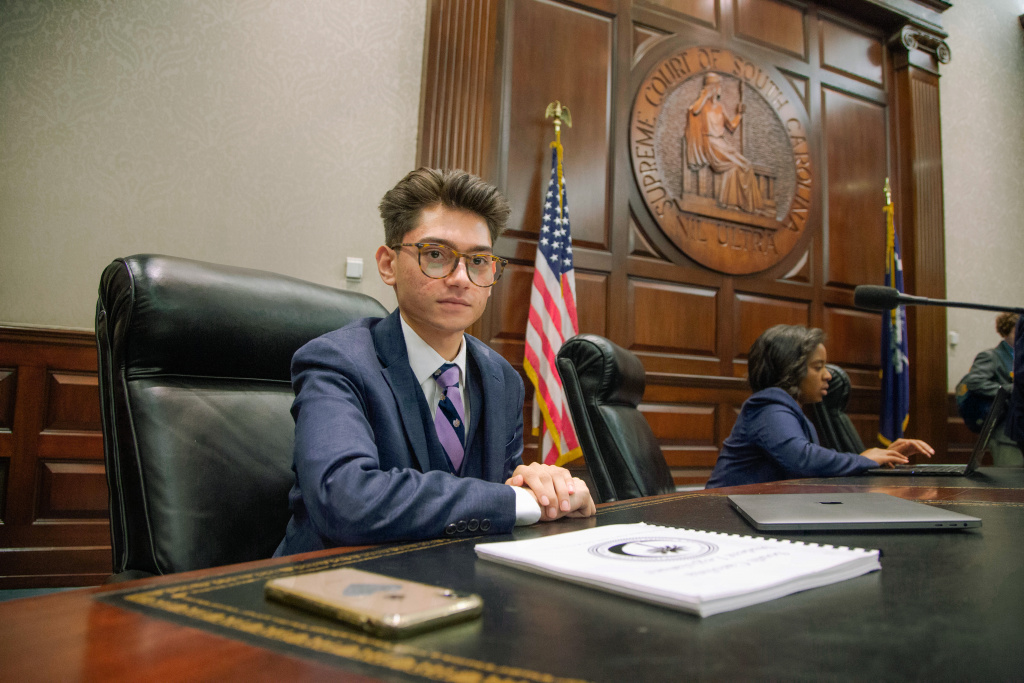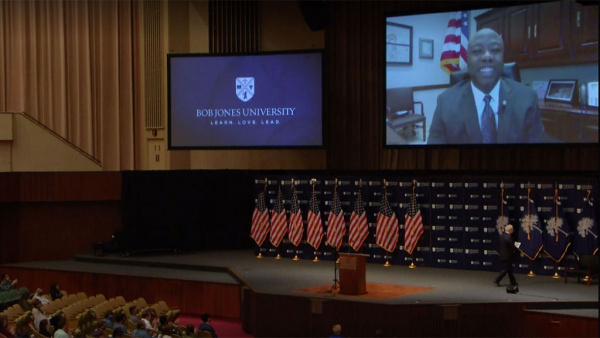Linda Abrams called the revamped political science program a “missing piece” in the landscape of BJU’s offerings that God has provided. “There are all kinds of things that it pairs with, especially offering the two tracks that just makes students more marketable in a world where national security is a very, very big topic.”
Beginning in the fall semester of the 2021–2022 academic year, students will be able to major rather than minor in political science. Two concentrations — American government and policy, or national security and foreign policy — allow students to tailor the program to fit their career goals.
An Answer to Prayer
The political science program is possible because a prayer was answered. “We’ve been praying at least 15 years for a PhD in political science to come,” said Dr. Brenda Schoolfield, chair of the Division of History, Government and Social Science. First begun in 1999, the political science program, as with all programs of study, required a terminal degree to continue under accreditation.
BJU terminated the major in 2012 when no instructor was found, though the University kept the minor. The minor gives students a survey of the key fields in political science. “It’s a fine minor, and it did what it needed to do, but we couldn’t go beyond that,” said Abrams.
But late in 2020, Dr. Jonathan Arnett applied to teach at BJU through a general interest application. Arnett is a retired U.S. Air Force officer with a PhD in political science from the State University of New York at Albany who has had assignments in Europe, the Middle East and the Pentagon. He has also served as the director of research of the Modern War Institute, an Army think tank, at West Point.
“We have somebody who basically we did not recruit, but the Lord just brought to us, who is a perfect fit in many, many ways, and he has a driving passion to see young people, Christians stand in the gap in these very important areas of public service,” said Abrams. “He’s just a perfect fit for us. We just wanted somebody with a PhD in political science, but the Lord gave us somebody who has instant credibility because of his experience.”
A Growing Need
The political science major is growing in universities across the country. According to niche.com, political science was the 14th most popular college major in the U.S. in the 2020–2021 academic year. Interest at BJU has increased proportionately.
Before the program was announced at the end of the spring semester, Schoolfield and Abrams had already seen two freshmen change their majors to political science. They’ve also had several emails forwarded from the Office of Admission expressing interest.
“I think we may hit the goal that we have,” said Abrams. Added Schoolfield: “We do have a goal. We would love to have 10 in the fall and 20 by the end of the year.”
A Better Equipped Graduate
Experiences before Graduation
All students in the program are required to take Introduction to Political Science in the fall semester of their freshman year. Though some students may enter the program with an idea of what to expect, as Schoolfield said, political science is “a different approach to data than history takes, and it’s more quantitative. … But it’s really a science. It’s political science.” The introductory course helps students gain an understanding of the discipline and the knowledge they will gain.
Then, through experiential learning, a capstone project that applies classroom learning to real life, and alumni guest speakers, students in BJU’s political science program get a taste of life after graduation.
In addition, study abroad trips and semesters or summers spent in Washington shadowing government officials are possibilities.
Acceptance into Graduate School
When BJU previously offered the major, the University was not accredited. Now, BJU is accredited through both the Southern Association of Colleges and Schools Commission on Colleges and the Transnational Association of Christian Colleges and Schools. “With accreditation, that smooths some of the bumps on the way to graduate school,” Schoolfield said.
Some students in the political science minor have gone on to graduate studies in political science. Abrams said they have had to make up prerequisites: “We have had a couple who have gone on to graduate work, but they’re missing a lot of the math statistic components with just the minor. So this is going to be a better foundation for graduate work as well.”
Well-Rounded Graduates
“Political science, people seem to associate it more with a career path, that they know what they’re going to do when they get out,” said Schoolfield. This program offers a variety of options.
Because the program pairs well with many other programs, students can choose their minor and electives to fit their life goals. Students in other majors can also benefit from the new course offerings.
“I can see it being part of somebody’s interdisciplinary program, especially if you want to go into law enforcement, and you have a minor in political science with an emphasis in national security,” said Abrams. “Students who are looking to pick up an elective in other departments may find an anti-terrorism class interesting or useful, or if you’re going through and doing journalism, maybe you want to take some national security (classes). I think there are other majors that will find electives in this new major. ”
The program will prepare students to go into a wide variety of fields, from working in government to public administration to Doctors Without Borders. Said Schoolfield: “We can be hands and feet of our Lord in ministering to our unsaved image bearers and have those absolutely unique opportunities to have redemptive conversations with people on a big level, on a small level, and it makes a difference. And so we are really thrilled that we have a program that can meet that need.”








